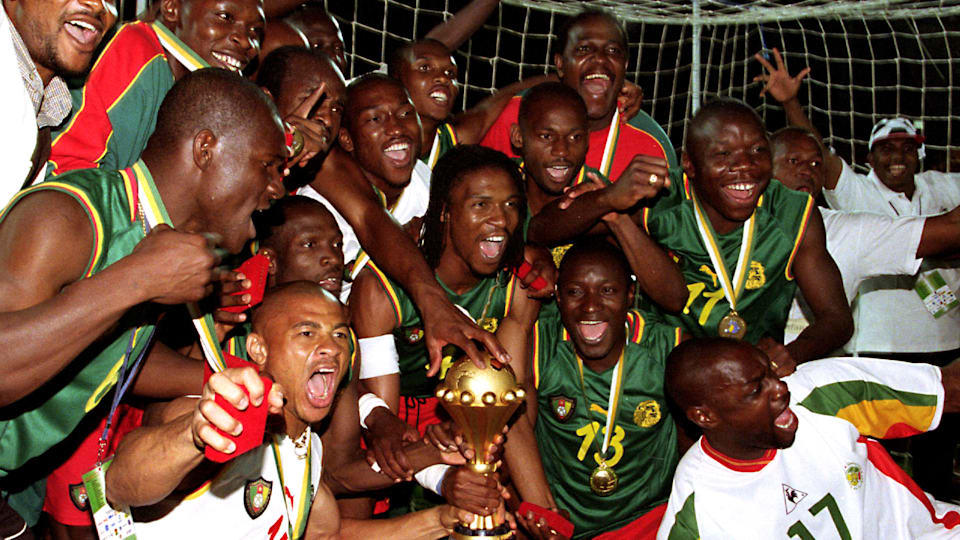
The CAF Africa Cup of Nations Cote d'Ivoire 2023, being held in January 2024, is the 34th edition of Africa's biennial national men's team football competition.
The tournament has come to capture the imagination like few others. Its vibrancy unmatched. Its stage helping catapult careers into the realms of superstardom.
And now it is bigger than ever.
Featuring 24 nations after a qualifying campaign involving 54 teams, AFCON has expanded in size while simultaneously reaching a wider audience with it's biennial events – a far cry from its origins more than 60 years ago.
The birth of AFCON
The Confederation of African Football (CAF) was founded by four nations in 1957: Egypt, Ethiopia, South Africa, and Sudan.
The first AFCON was held that year but South Africa’s policy of apartheid prompted their exclusion meaning there were just three teams in the competition.
Egypt were the first winners, beating Sudan 2-1 in the semi-final and then Ethiopia 4-0 in the final.
Egypt, under the guise of United Arab Republic following its short-term union with Syria, would win again in 1959, but this would prove to be the end of the closed shop with qualification introduced from the 1962 edition onwards.
The tournament slowly expanded thereafter. From four nations in 1962, six competed in 1963 and 1965, but soon eight became the norm.
One of the many beauties of AFCON is its unpredictability. That remains as much the case now as it was when just eight nations played in the tournament.
In the 12 eight-team editions from 1968 to 1990 inclusive, there were no fewer than 10 different winners with Ghana the first repeat winners (1978 and 1982) in that period.
The 90s boom
The 1990s saw African football make shockwaves around the world – repeatedly.
One such feat was Cameroon becoming the first African nation to reach the FIFA World Cup quarter-finals in 1990 having stunned Diego Maradona's reigning champions Argentina in the opening game.
But that was arguably eclipsed by Nigeria’s sensational triumph at the Atlanta 1996 Olympic Games where the young Super Eagles - since 1992 men's football has been an under-23 tournament - won gold thanks to respective victories over South American powerhouses Brazil and Argentina in the semi-finals and the final.
All the while, individual players were becoming globally recognised.
Roger Milla was defying age, playing for Cameroon at the 1994 World Cup aged 42.
Nwankwo Kanu was defying medical science. The forward had earned a big-money move from Dutch giants Ajax to Inter before spearheading Nigeria's triumph in Atlanta including scoring a late equaliser and golden goal winner against Brazil.
He was then diagnosed with a serious heart defect and told he would never play again, but surgery righted the issue and he - along with Cameroon right-back Lauren - was part of Arsenal's 'Invincibles' who went the whole of the 2003-04 Premier League season unbeaten.
Another striker, Liberia's George Weah, was defying belief. Weah won both the FIFA World Player of the Year and Ballon d’Or in 1995 and remains the only African player to claim these awards.
With African football enjoying a boom, AFCON itself expanded to 12 teams in 1992 before settling on 16 in 1996 – a format which would remain in place until 2017.
During this time, Cameroon emerged as the team to beat with back-to-back AFCON title wins in 2000 and 2002, only for Egypt to go one better when winning three in a row from 2006 to 2010.
Global recognition
In this new age of social media, AFCON has arguably gone to another level now that viral clips can be shared the world over, be it goals from distance or skills that seem to defy the laws of physics.
This rise in AFCON’s popularity has coincided – not accidentally – with Africans starring at top European clubs.
Weah made his name at Monaco, Paris Saint-Germain and AC Milan before Samuel Eto’o shone at Barcelona and Inter.
In England, Ivorians Didier Drogba and Yaya Toure respectively steered Chelsea and Manchester City to a host of honours and, more recently, Senegal's Sadio Mane and 'Egyptian King' Mo Salah fronted Liverpool’s recent haul of trophies.
A golden age for African football, perhaps. But the 2023 edition, being held in early 2024 in Cote d'Ivoire (Ivory Coast), may just be the latest chapter of the continent's growth on the world scene.
And after Morocco made history by reaching the World Cup semi-finals in 2022, an African side becoming world champions is no longer beyond the bounds of reality.
When that will happen is unknown, but AFCON is without doubt the platform for such a feat to take flight.
